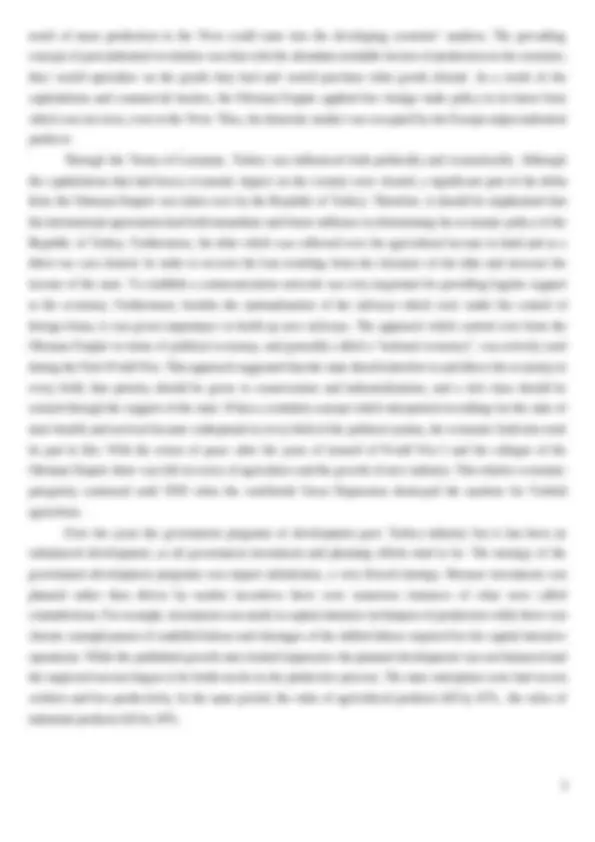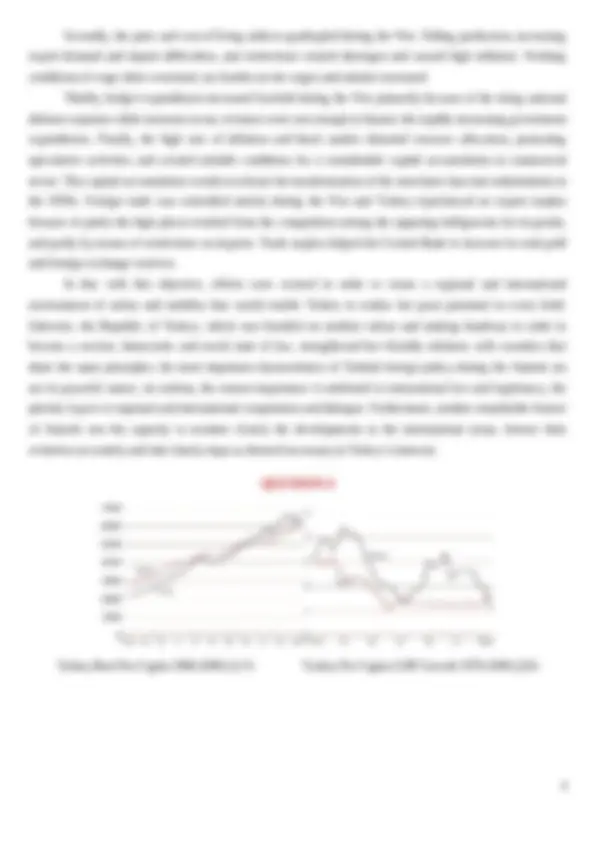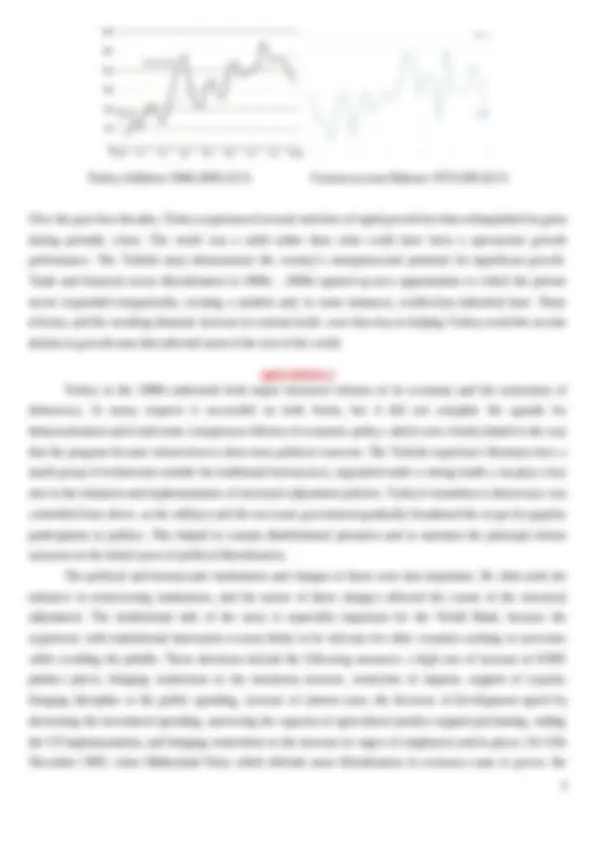





Study with the several resources on Docsity

Earn points by helping other students or get them with a premium plan


Prepare for your exams
Study with the several resources on Docsity

Earn points to download
Earn points by helping other students or get them with a premium plan
Community
Ask the community for help and clear up your study doubts
Discover the best universities in your country according to Docsity users
Free resources
Download our free guides on studying techniques, anxiety management strategies, and thesis advice from Docsity tutors
Selcuk University - Neba Wais Alqorni
Typology: Assignments
1 / 6

This page cannot be seen from the preview
Don't miss anything!




Name & Surname: Neba Wais Alqorni Student Number: 180613056 S.U. FACULTY OF ECONOMICS AND ADMINISTRATIVE SCIENCES DEPARTMENT OF INTERNATIONAL RELATIONS ECONOMY OF TURKEY MIDTERM ASSIGNMENT QUESTION- By the Decree of Muharrem the Ottoman public debt was reduced from £191 million to £ million, certain revenues were assigned to debt service, and a European-controlled organization, the Ottoman Public Debt Administration , was set up to collect the payments. The OPDA subsequently played an important role in Ottoman affairs, acting as agent for the collection of other revenues and as an intermediary with European companies seeking investment opportunities. Its influence, however, should not be exaggerated. The OPDA remained under Ottoman political control, and its existence even enabled the Ottomans to add to the debt at the annual rate of £3 million throughout the reign of Abdulhamid; nor was the burden of repayments a major drain on the country’s resources. But taken in conjunction with the activities of European-controlled banks and with the tariff limitations imposed on the Ottomans by the Capitulations, the result was a distinct restriction on Ottoman ability to guide the allocation of resources. The first major restriction imposed by the capitulations was that the Ottoman government was deprived of its sovereign rights to set customs duties in a way that maximized its revenues whilst protecting local industry. European governments exercised such rights; indeed, at a time when most of the European powers were endeavoring to protect their own industry and agriculture from foreign protection, the same powers were constantly pressurizing the Porte to lower customs barriers. The second major restriction imposed by the capitulations concerned state monopolies. However, the Ottoman Empire was deprived of the right to establish monopolies in sectors other than salt and tobacco. According to Adam Block, these treaties, by preventing the establishment of monopolies, constituted a ‘serious obstacle to the progress and security of the country’. In terms of its effects on the general economy, this argument has both its pros and cons. However, it is also true that establishing such monopolies would impose costs on the economy by blocking private attempts at industrialization in these sectors. The final major restriction imposed on the development of state revenues was the tax privileges granted to foreign citizens. This privileged population included not only foreigners but also a number of minorities in the business world, the protégés of the European powers. QUESTION- The Treaty of Lausanne, Turkey was influenced both politically and economically. Although the capitulations that had heavy economical impact on the country were cleared, a significant part of the debts from the Ottoman Empire was taken over by the Republic of Turkey. Considering the borders prescribed by the Treaty of Lausanne, the debts of the Ottoman Empire were distributed among Turkey and the other states established within the borders of the former Ottoman Empire. When a break was taken in the Lausanne Conference , the Economic Congress in Izmir. Young Turkey’s economic problems were the main issue for the
country which newly got out of the battle. The goal of the Congress was to bring about an agreement on the national economic policy which would be put into practice among the government staff, landowners, traders, and industrialists. These arguments obviously represent an idea that refers to a ‘nationalistic’ political structure with terms like ‘independency’ and ‘national sovereignty’. The economic area would also be organized for this purpose, it was decided to develop the domestic production, prohibit luxury imports, permit foreign capital provided that it contributed to economic development. The decisions of the Economic Congress in Izmir are considered the basic provisions of a conservative and nationalist economic policy aiming to achieve improvement of the country by providing the governmental support for private enterprise. Furthermore, the tithe which was collected over the agricultural income in kind and as a direct tax was cleared. Instead, a profit tax was created in order to compensate for the tax loss. Other economic activities of the state in this era were in communications it is said that the significant characteristics of economic development for the period between 1929 and 1938 resulted from two events; one was internal and the other was external. It is suggested that these two events justify the state’s interference in the economic life of the country. When the prices decreased, the foreign trade was reduced to a minimum level. Following the initial crisis, Turkey increased its customs duties. On the other hand, starting to pay off the debts inherited from the Ottomans is considered first among the factors which led to etatism very fast. The etatism applied in this era included the following principles:
Secondly, the price and cost of living indices quadrupled during the War. Falling production, increasing export demand and import difficulties, and restrictions created shortages and caused high inflation. Working conditions of wage labor worsened, tax burden on the wages and salaries increased. Thirdly, budget expenditures increased fourfold during the War primarily because of the rising national defense expenses while increases in tax revenues were not enough to finance the rapidly increasing government expenditures. Finally, the high rate of inflation and black market distorted resource allocation, promoting speculative activities, and created suitable conditions for a considerable capital accumulation in commercial sector. This capital accumulation would accelerate the transformation of the merchant class into industrialists in the 1950s. Foreign trade was controlled strictly during the War and Turkey experienced an export surplus because of partly the high prices resulted from the competition among the opposing belligerents for its goods, and partly by means of restrictions on imports. Trade surplus helped the Central Bank to increase its total gold and foreign exchange reserves. In line with this objective, efforts were exerted in order to create a regional and international environment of safety and stability that would enable Turkey to realize her great potential in every field. Likewise, the Republic of Turkey, which was founded on modern values and making headway in order to become a secular, democratic and social state of law, strengthened her friendly relations with countries that share the same principles. the most important characteristics of Turkish foreign policy during the Ataturk era are its peaceful nature, its realism, the utmost importance it attributed to international law and legitimacy, the priority it gave to regional and international cooperation and dialogue. Furthermore, another remarkable feature of Ataturk was his capacity to monitor closely the developments in the international arena, foresee their evolution accurately and take timely steps as deemed necessary in Turkey’s interests. QUESTION- Turkey Real Per Capita 1960-2000 (1) % Turkey Per Capita GDP Growth 1970-2000 (2)%
Turkey Inflation 1968-2000 (3) % Current account Balance 1974-200 (4) % Over the past four decades, Turkey experienced several stretches of rapid growth but then relinquished its gains during periodic crises. The result was a solid rather than what could have been a spectacular growth performance. The Turkish story demonstrates the country’s entrepreneurial potential for significant growth. Trade and financial sector liberalization in 1960s – 2000s opened up new opportunities to which the private sector responded energetically, creating a modern and, in some instances, world-class industrial base. These reforms, and the resulting dramatic increase in external trade, were thus key to helping Turkey avoid the secular decline in growth rates that affected most of the rest of the world. QUESTION- Turkey in the 1980s undertook both major structural reforms of its economy and the restoration of democracy. In many respects it succeeded on both fronts, but it did not complete the agenda for democratization and it had some conspicuous failures of economic policy, which were closely linked to the way that the program became subservient to short term political concerns. The Turkish experience illustrates how a small group of technocrats outside the traditional bureaucracy, organized under a strong leader, can play a key role in the initiation and implementation of structural adjustment policies. Turkey's transition to democracy was controlled from above, as the military and the successor government gradually broadened the scope for popular participation in politics. This helped to contain distributional pressures and to maintain the principal reform measures in the initial years of political liberalization. The political and bureaucratic institutions and changes to them were also important. He often took the initiative in restructuring institutions, and the nature of these changes affected the course of the structural adjustment. The institutional side of the story is especially important for the World Bank, because the experience with institutional innovation is most likely to be relevant for other countries seeking to successes while avoiding the pitfalls. These decisions include the following measures: a high rate of increase in SOEE product prices, bringing restrictions to the emissions increase, restriction of imports, support of exports; bringing discipline to the public spending, increase of interest rates, the decrease of development speed by decreasing the investment spending, narrowing the capacity of agricultural product support purchasing, ending the CP implementation; and bringing restrictions to the increase in wages of employees and in prices. On 13th December 1983, when Motherland Party which defends more liberalization in economy came to power, the